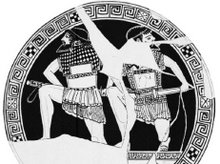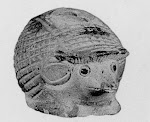I'm often asked: "What happened to Sparta after her loss of hegemony to the Thebans?" I thought I would post a quick review of later Spartan history.
The Thebans put an end to Spartan Hegemony and "free" the helots of Messenia (those in Laconia remain), sealing the deal with the creation of the city of Megalopolis to block westward movements out of Lacedaimonia. Sparta now consists of Laconian alone, but the governing system is unchanged.
The Spartans decline to join Alexander's merry band. In conjunction with Persian naval elements, they lead an ill-fated war against the Macedonian Hegemony while Alexander is somewhere between Issus and Guagamela. They take over Crete and much of the Peloponnese before meeting the macedonian governor at the "Battle of mice" and losing. Sparta is left essentially unchanged, though humbled once again. Had they won we would remember Alexander the pretty good, conqueror of Anatolia.
In the time of the successors Sparta remains one of the more powerful second-tier states. She loses a battle to Demetrios, but the "besieger" fails to besiege her. Between around 300BC and 250BC she lets her Agoge system falter, becoming more like the rest of greece. Areus in this period is the first Spartan king to put his face on coins in imitation of the other great kings. Sparta is still a source for great mercenary generals in this century.
A notable figure early in the century is Cleonymus, a Spartiate and mercenary who fights for Pyrrus of Epirus to good effect in macedonia. Later as Pyrrus' fortunes wane, he convinces him to besiege the city of Sparta. The Spartan men are off in Crete fighting, presumably earning money, when the attack comes and the Pyrrus is defeated by the old and young men. The men then show up and they chase follow his retreat to Argos where he is killed in street fighting- by an old woman throwing a roof tile!
The most famous Spartan mercenary general hails from this period, when Xanthippus leads a losing Carthaginian army to defeat the invading Romans under Regulus, changing the course of the first Punic war. Hannibal had as a tutor a Lakedaimonian as well, who wrote a now lost history of his wars. The Spartans are interesting in the mid to late 200s BC because a King, Agis, tries to undo all of their social problems by recreating the original Lycurgan system. The plan starts off well, but is sabotaged and Agis is executed. Many disenfranchised greeks in other states looked at this example favorably- their upper classes were not pleased. The Aetolians invade and take huge numbers of helots as slaves, while the Spartans are too disorganized to stop them.
The Achean league under Aratus throw out the Macedonian governor Alexander from the Peloponnese. All of Greece was free of a reeling macedon at this time, it was the last, missed, opportunity for autonomy.
In an odd twist of history, the murdered reformer King Agis' wife married the son of the man who did him in. She or simple political strategy lead him to attempt the same reforms. He, Cleomenes III, is very successful but brutal, casting out the other blood-line of kings and the Ephors and essentially becoming a tyrant (for good, so he says). His program is very popular with the underclasses in other cities and he threatens to topple the Achean league, the power that balances against Sparta. Aratus and the Acheans call in the Macedonians for help at the price of giving up all the gains they made in kicking them out earlier!
Cleomenes builds a large army by raising about 4,000 new Spartan citizens through land reform, by buying mercenaries with subsidies from Ptolemy against Antigonas Doson of Macedon, and by freeing 2,000 Helots who can afford to buy their freedom. They meet at Sellasia on the road to Sparta and after a truly horrific and close battle, Antigonas wins. He makes a show of returning Sparta to its ancestral ways- returning the Ephors after kicking out the tyrant Cleomenes, but Sparta never truly recovers her ancestral ways.
The next few decades are marked by a series of Tyrants who build up armies of mercenaries and freed helots, but they all fall. Phillip V of Macedon romps through Laconia, but like so many before him does not take the city of Sparta. The last, Nabis, who claims kingship through a tie to the long exiled Damaratus who accompanied the Persian invasion, makes sweeping "reforms"- exiling many Spartiates and enfranchising rich helots. In the end he is undone by his own Aetolian mercenaries.
Sparta's independant hsitory ends here at the hands of a fellow greek, Philipoemen who "frees" Sparta from tyrrany and this time force her to become a member of the Achean league after recalling the exiles and kicking out the new helot citizens (selling many into slavery). Eventually the Romans step in, but they confirm Sparta as a member of the Achean league.
Sparta flourishes under the Romans, with a number of senators coming from her citizens. She also becomes a bit of a farce, a theme park for rich romans to pretend to enjoy what the ancient Sparta was. A Spartan admiral, Eurycles, son of a Kytherian pirate, on the side of Octavius chases Cleopatra and Anthony's ship and their treasure ship after Actium. Although Eurycles makes a great show of confronting Anthony across the bows, for Anthony had his pirate father killed, in the end these spartans, unlike their forefathers, opt to take the treasure ship. Eurycles becomes a roman citizen and de facto leader of Sparta, whose boundaries are altered by Agustus. He seems to have gone on some sort of mission to Judea and intrigued there with Herod. He ends up being exiled for a time due to the protests at rome of no less a family than that of Brasidas, but ends his days in honor. His children hold high positions and his grandson is a made a Roman senator.
Sparta is eventually sacked by the Goths in the 4th c AD, with many citizens fleeing south to more remote and mountainous regions of laconia. The peoponnese is heavily settles by Slavic tribes in the early Byzantine period, at least one of which, the Melingi, keeps its tribal identity into the time of the Latin conquest.
Geoffroy de Villehardouin, after the 4th crusade, holds sway over Laconia and builds or rebuilds a series of castles to keep out the slavs and unhappy greeks. (One of these is named Castro Bardounia, sharing the name of your humble web host)
The region later becomes Venetian, then Turkish, though it falls to the turks after Constantinople and for a time the Byzantine nobility flees there. The people of the Mani peninsula in southern Laconia in particular, claim to be spartans and are addressed as such even by leaders even as late as Napoleon- who oddly had as a godfather an expatriate Maniate in Corsica. The revolt from the Turks starts in the Mani, so it could be claimed that the "Spartans" once again defeated the Eastern menace to Greek Independence.
Wednesday, February 6, 2008
Subscribe to:
Post Comments (Atom)




1 comment:
I laughed at "Alexander the Pretty Good, Conqueror of Anatolia".
Excellent blog, by the way!
Post a Comment